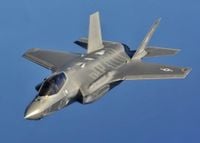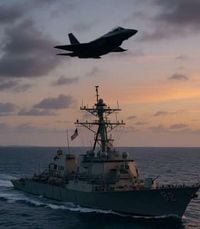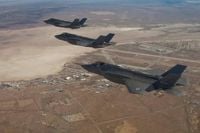In a dramatic escalation of tensions between the United States and Venezuela, President Donald Trump has ordered the deployment of 10 F-35 stealth fighter jets to Puerto Rico, signaling a show of force in the Caribbean that has left the region on edge. This move comes as the Trump administration intensifies its campaign against Latin American drug cartels, which Washington has designated as "narco-terrorist" organizations, but it has also fueled speculation about broader strategic aims—particularly regarding the embattled government of Venezuelan President Nicolás Maduro.
The deployment, confirmed on September 5, 2025, marks one of the most significant U.S. military buildups in the southern Caribbean in recent years. According to Military.com and Newsweek, the F-35s—America’s most advanced warplanes, typically reserved for high-stakes confrontations against major military powers—are being stationed at a Puerto Rican airfield to support anti-drug operations. Yet, the sheer scale and sophistication of the deployment have prompted questions about whether the true target is Venezuela’s government rather than just drug traffickers.
The context for this military surge is fraught. Just days before the F-35s arrived, U.S. forces destroyed a speedboat in the Caribbean, which President Trump claimed was linked to the notorious Venezuelan gang Tren de Aragua. The strike killed 11 people and, according to CNN and Global Defense News, was part of a broader campaign to disrupt drug trafficking networks allegedly supported by the Maduro regime. The Venezuelan government, however, denounced the attack as an "extrajudicial killing" of civilians, and legal experts have raised concerns about the operation’s legitimacy.
The U.S. military presence in the region now includes at least seven warships, a nuclear-powered fast-attack submarine, and more than 4,500 sailors and Marines, as reported by The New York Times. The Pentagon’s posture has been described as a deterrent against both drug cartels and any potential interference from Venezuelan forces. Tensions flared further when two Venezuelan F-16 fighter jets flew near the USS Jason Dunham, a guided-missile destroyer, prompting the U.S. Department of Defense to label the maneuver "highly provocative." President Trump responded with a stark warning: "If they do put us in a dangerous position, they’ll be shot down."
For his part, President Maduro has not backed down. In a nationally televised address, he warned that Venezuela would "immediately enter a period of armed struggle" if attacked, though he insisted the country is "still in the phase of unarmed struggle." Maduro emphasized the mobilization of the Bolivarian National Militia and the preparation of the population for defense, stating, "The deployment of the defensive, training, and retraining capacities of the entire population" was underway. He also claimed that Venezuela’s military, including reservists and militia members, numbers over eight million—a figure that, while likely inflated, underscores the government’s determination to project strength.
Maduro’s rhetoric was matched by a direct appeal to Washington. "The US should abandon its plan of violent regime change in Venezuela and in all of Latin America," he declared, as reported by Anadolu Agency. "And respect the sovereignty, the right to peace, and the independence of our countries." Despite the saber-rattling, Maduro also struck a conciliatory note: "None of the differences we’ve had can lead to a military conflict. Venezuela has always been willing to converse, to dialogue."
President Trump, however, has kept the pressure on. While denying that the U.S. is seeking regime change in Venezuela, he has been openly critical of Maduro’s 2025 election, calling it "a very strange election, to put it mildly." Trump has also accused the Maduro regime of opening its prisons to release members of the Tren de Aragua criminal organization, who he claims are now operating within the United States. "We don’t want drugs coming in from Venezuela or anybody else, or any place else, so we’ll be tough on that," Trump told reporters, reiterating his administration’s commitment to combating drug trafficking in the hemisphere.
Secretary of State Marco Rubio, a long-time critic of Maduro, has been a vocal proponent of confronting Venezuela. According to Military.com and Global Defense News, Rubio has pushed for economic sanctions and even military intervention, framing the Maduro government as a "narco-terror cartel." Defending the administration’s aggressive tactics, Rubio stated, "What will stop them is when you blow them up, when you get rid of them. If you’re on a boat full of cocaine or fentanyl headed to the United States, you’re an immediate threat to the United States."
The official U.S. line is that the deployment of F-35s and the naval buildup are aimed squarely at disrupting drug cartels. Yet, as The New York Times and Honolulu Star-Advertiser have noted, the unprecedented scale of the operation has led to speculation about ulterior motives. Critics argue that the show of force may be intended to pressure Maduro, distract from domestic controversies, or even lay the groundwork for more direct intervention. Some analysts have pointed to Venezuela’s vast oil reserves as a potential factor in Washington’s calculus.
Venezuela’s Foreign Minister, Yvan Gil, has dismissed the U.S. justification for the military buildup as "the biggest lie," accusing the Trump administration of using drug trafficking as a pretext for regime change. The Venezuelan government has called for international support in defending its sovereignty and has begun training civilians in defense tactics during what it calls "activation days."
Despite the heated rhetoric and military posturing, both sides have signaled—at least publicly—a desire to avoid outright conflict. Maduro has repeatedly called for dialogue, and Trump, while issuing stern warnings, continues to insist that regime change is not the official U.S. objective. Still, the risk of miscalculation remains high, especially with heavily armed forces operating in such close proximity and political tensions running white-hot.
As the situation develops, regional and international observers are watching closely to see whether the standoff will escalate further or give way to negotiations. For now, the Caribbean remains a flashpoint, with the world’s most advanced warplanes flying patrols and both leaders trading warnings—each determined to prove their resolve on the global stage.
In the midst of this uncertainty, the people of Venezuela and the wider Caribbean are left hoping that cooler heads will prevail, and that the specter of armed conflict will not become reality.



